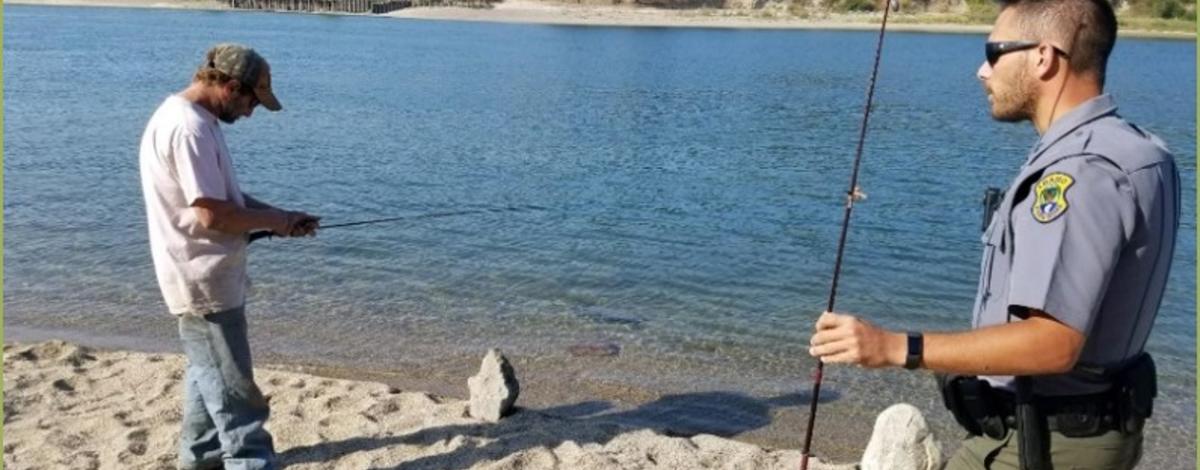Hello! My name is Officer Jacob Berl and I am the local Coeur d’Alene Conservation Officer stationed in the Panhandle Region. Chances are, if you’ve spent much time hunting, fishing, trapping, or otherwise recreating in Idaho’s great outdoors, you’ve probably bumped into an officer like me. Hopefully for most, the visit was pleasant, productive, and ended with a handshake.

Conservation officers with Idaho Fish and Game spend countless hours each year patrolling Idaho’s sprawling landscapes and interacting with sportsmen and women to ensure Idaho’s wildlife resources are enjoyed safely, ethically, and sustainably. My guess is that most folks have had the opportunity to chat with a conservation officer at some point in their outdoor career. Although these interactions are usually friendly and benign, it’s been well documented that citizens often report feeling uneasy during interactions with law enforcement.
Interactions with conservation officers don’t need to be stressful. In fact, they should be quite the opposite! After all, the vast majority of people we connect with on a daily basis are law-abiding sportsmen and women enjoying the great outdoors. Here are three simple tips to keep in mind the next time a conservation officer stops to chat with you.
- Be Patient and Kind
When connecting with an individual, we usually don’t know who we are dealing with—a license check could simply be a grandparent taking kids fishing, or a felon on the run, who decided to get off the grid. This uncertainty adds to the challenge, and danger, of our jobs. The best approach during a contact is simply to be kind, patient, and understanding. All qualities I’m sure you expect from your local conservation officer, as well. Our goal is to treat citizens fairly. All good relationships are built on honesty and trust, and your relationship with your local game warden should be no different.
- Ask Questions
I’m sure most folks have heard the age-old adage, “there is no such thing as a dumb question”. Well in the world of wildlife and law enforcement, those words might as well be scripture. Our job is to assist sportsmen and women in their understanding of Fish and Game rules and regulations. In a perfect world, everyone would know, understand, and properly follow regulations, and I’d be out of a job! However, regulations can be complex and confusing. Sometimes mistakes are made and if you don’t ask questions, you’ll never get an answer. What better time to ask questions than when you’ve got a conservation officer standing right in front of you! We aren’t encyclopedias of knowledge, but chances are, we can answer the majority of your questions about the do’s and don’ts and perhaps even share a tidbit about the next fishing hole around the corner. You just have to ask!
- Help by reporting violations
Most ethical hunters, anglers, and trappers will tell you that nothing upsets them more than seeing others abuse the wildlife and natural resources that we all collectively love. I couldn’t agree more. It’s no secret that we can’t be everywhere at the same time, and wildlife can’t speak for themselves. So we need YOU to be the eyes and ears, do what’s right, and report wildlife crimes. It’s that simple.

Research shows that those who know, trust, and have developed a relationship with their local conservation officer are more likely to report wildlife violations when they see them. A great time to foster that relationship is the next time you’re contacted by a conservation officer. If you know of or suspect wildlife crimes, please consider sharing your information with a conservation officer the next time you see them. I can guarantee they will appreciate what you have to share, and more importantly, so will the wildlife.
Interactions with an Idaho conservation officer should be positive and improve your outdoor experience. Hopefully by keeping these three simple tips in mind, you’ll be more at ease and better prepared for the next time you see us in the field. And as always, please do your part and report wildlife violations by calling the Citizens Against Poaching (CAP) hotline at (208) 632-5999.

